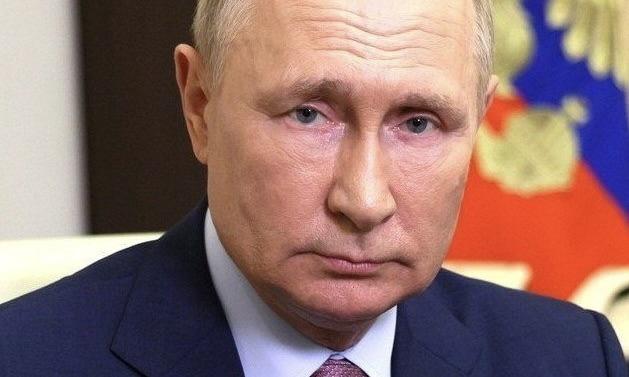Russian President Vladimir Putin has publicly acknowledged a significant security lapse following the assassination of General Igor Kirillov, the head of Russia’s military chemical weapons unit. The rare admission of failure highlights vulnerabilities in the nation’s intelligence apparatus amid ongoing conflict with Ukraine.
General Kirillov’s Assassination Shakes Moscow
Kirillov was killed on Tuesday in a bombing described as Ukraine’s most audacious act of retaliation since the war began. According to Russian investigators, explosives were hidden in an electric scooter near the entrance of a residential building in Moscow. The device detonated as Kirillov and his assistant exited the building, killing both.
Kyiv quickly claimed responsibility for the attack, with a source in Ukraine’s SBU security services labeling Kirillov a “legitimate target.” The official accused him of overseeing the deployment of banned chemical weapons on the eastern Ukrainian frontline.
Russian authorities have detained a 29-year-old Uzbek national suspected of carrying out the bombing. The Investigative Committee reported that the suspect allegedly admitted to being recruited by Ukrainian special forces.
Putin’s Rare Admission of Security Failures
During his annual end-of-year press conference on Thursday, Putin addressed the incident, acknowledging deficiencies in Russia’s intelligence operations. “Our special services are missing these hits. It means we need to improve this work. We must not allow such serious blunders to happen,” he stated.
Putin’s admission comes amid a growing number of high-profile attacks on Kremlin-linked figures. Previous incidents include the August 2022 car bombing of nationalist Darya Dugina and the April 2023 explosion in a Saint Petersburg café that killed military correspondent Vladlen Tatarsky. Both were attributed to Ukrainian operatives, signaling Kyiv’s increasing reach within Russian borders.
Criticism of Russian Security Protocols
The assassination has raised questions in Moscow about the effectiveness of security measures for high-ranking officials directly involved in the war effort. Analysts have pointed to systemic weaknesses within Russian intelligence agencies, which have struggled to counter escalating attacks on home soil.
Putin’s acknowledgment of these vulnerabilities marks a shift in rhetoric from the Kremlin, which has traditionally downplayed security lapses. Critics argue that the Russian president is facing mounting pressure to address domestic threats as public confidence in state institutions erodes.
Public Reaction on Social Media
The high-profile assassination and Putin’s comments have sparked intense debate on social media platforms. Twitter user @RussiaObserver wrote, “Putin admitting a failure in intelligence is unprecedented. This reflects deeper systemic issues in the Kremlin.” Conversely, @ProKremlinVoice defended the government, stating, “Such attacks are acts of terrorism, and Ukraine’s actions will only strengthen Russia’s resolve.”
Meanwhile, @UkraineWatcher commented, “Kyiv’s ability to strike deep inside Moscow is a game-changer. Russia must rethink its security strategy.” User @SecurityAnalyst noted, “This assassination exposes the vulnerabilities of Russian elites. It’s a turning point in the conflict.”
On the other hand, @PeaceAdvocate tweeted, “Escalation on both sides will only prolong the suffering. Diplomacy must prevail before more lives are lost.” Finally, @WarUpdates2024 remarked, “These targeted attacks show the extent of Ukraine’s resolve. Russia’s internal stability is now under question.”
Conclusion
The assassination of General Kirillov has intensified scrutiny on Russia’s intelligence capabilities and heightened tensions between Moscow and Kyiv. As both nations escalate their strategies, the conflict shows no signs of abating, leaving profound implications for regional security and international stability.



 South Korea Assures U.S. on Trade Deal Commitments Amid Tariff Concerns
South Korea Assures U.S. on Trade Deal Commitments Amid Tariff Concerns  Trump Endorses Japan’s Sanae Takaichi Ahead of Crucial Election Amid Market and China Tensions
Trump Endorses Japan’s Sanae Takaichi Ahead of Crucial Election Amid Market and China Tensions  Trump Signs “America First Arms Transfer Strategy” to Prioritize U.S. Weapons Sales
Trump Signs “America First Arms Transfer Strategy” to Prioritize U.S. Weapons Sales  Trump Allows Commercial Fishing in Protected New England Waters
Trump Allows Commercial Fishing in Protected New England Waters  Trump Lifts 25% Tariff on Indian Goods in Strategic U.S.–India Trade and Energy Deal
Trump Lifts 25% Tariff on Indian Goods in Strategic U.S.–India Trade and Energy Deal  Trump Allegedly Sought Airport, Penn Station Renaming in Exchange for Hudson River Tunnel Funding
Trump Allegedly Sought Airport, Penn Station Renaming in Exchange for Hudson River Tunnel Funding  NATO to Discuss Strengthening Greenland Security Amid Arctic Tensions
NATO to Discuss Strengthening Greenland Security Amid Arctic Tensions  Ukraine-Russia Talks Yield Major POW Swap as U.S. Pushes for Path to Peace
Ukraine-Russia Talks Yield Major POW Swap as U.S. Pushes for Path to Peace  U.S. to Begin Paying UN Dues as Financial Crisis Spurs Push for Reforms
U.S. to Begin Paying UN Dues as Financial Crisis Spurs Push for Reforms  Ohio Man Indicted for Alleged Threat Against Vice President JD Vance, Faces Additional Federal Charges
Ohio Man Indicted for Alleged Threat Against Vice President JD Vance, Faces Additional Federal Charges  Trump Signs Executive Order Threatening 25% Tariffs on Countries Trading With Iran
Trump Signs Executive Order Threatening 25% Tariffs on Countries Trading With Iran  Marco Rubio Steps Down as Acting U.S. Archivist Amid Federal Law Limits
Marco Rubio Steps Down as Acting U.S. Archivist Amid Federal Law Limits  U.S. Announces Additional $6 Million in Humanitarian Aid to Cuba Amid Oil Sanctions and Fuel Shortages
U.S. Announces Additional $6 Million in Humanitarian Aid to Cuba Amid Oil Sanctions and Fuel Shortages  Newly Released DOJ Epstein Files Expose High-Profile Connections Across Politics and Business
Newly Released DOJ Epstein Files Expose High-Profile Connections Across Politics and Business  Missouri Judge Dismisses Lawsuit Challenging Starbucks’ Diversity and Inclusion Policies
Missouri Judge Dismisses Lawsuit Challenging Starbucks’ Diversity and Inclusion Policies  Nighttime Shelling Causes Serious Damage in Russia’s Belgorod Region Near Ukraine Border
Nighttime Shelling Causes Serious Damage in Russia’s Belgorod Region Near Ukraine Border  Pentagon Ends Military Education Programs With Harvard University
Pentagon Ends Military Education Programs With Harvard University 




























